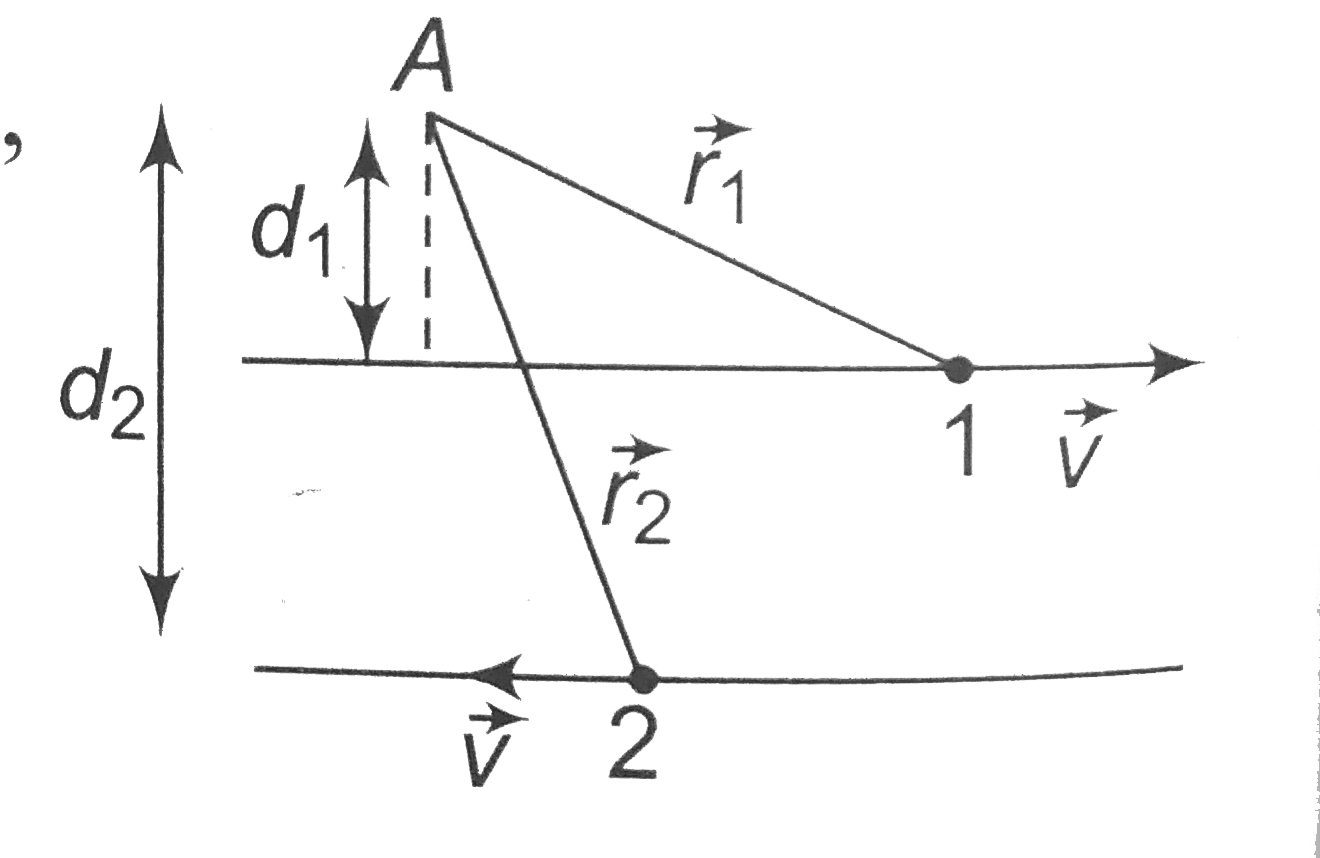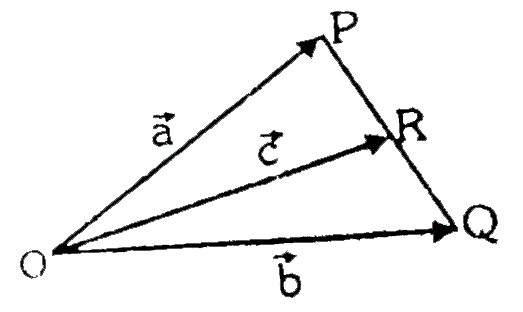Figure shows two identical particles 1 and 2, each of mass m, moving in opposite directions with same speed →V along parallel lines. At a particular instant, →r1 and →r2 are their respective position vectors drawn from point A which is in the plane of the parallel lines. Which of the following is the correct statement ?
 .
.
Angular momentum →L1 of particle 1 about A is →L1=mv→r1⊙
Angular momentum →L2 of particle 2 about A is →L2=mv→r2⊙
Total angular momentum of the system about is →L=mv(→r1+→r2)⊙
Total angular momentum of the system about A is →L=mv(d2−d1)⊗
[Here, ⊗ represents a unit vector going into the page and ⊙ represents a unit vector coming out of the page].
The correct Answer is:D
(d) Angular momentum of particle 1 about A is
→L1=mvd1⊙
Angular momentum of particle 2 about A is
→L2=mvd2⊗
:. Total angular momentum of the system about A is →L=→L2−→L and (∵L1andL2 are in opposite directions) →L=mv(d2−d1)⊗.
Topper's Solved these Questions
- BOOK - A2ZCHAPTER - ROTATIONAL DYNAMICSEXERCISE - Assertion Reasoning20videos
ROTATIONAL DYNAMICS
- BOOK - A2ZCHAPTER - ROTATIONAL DYNAMICSEXERCISE - NEET Questions59videos
ROTATIONAL DYNAMICS
- BOOK - A2ZCHAPTER - ROTATIONAL DYNAMICSEXERCISE - Rotation And Translation Combined And Rolling Motion18videos
ROTATIONAL DYNAMICS
- BOOK - A2ZCHAPTER - PROPERTIES OF MATTEREXERCISE - Chapter Test29videos
PROPERTIES OF MATTER
- BOOK - A2ZCHAPTER - THERMAL PROPERTIES OF MATTEREXERCISE - Chapter Test30videos
THERMAL PROPERTIES OF MATTER
Similar Questions
Two particles each of mass m and speed v, travel in opposite direction along parallel lines separated by a distance d. Show that the vector angular momentum of this system of particles is the same about any point taken as origin.
View SolutionP and Q are two points with position vectors 3→a−2→b and →a+→b respectively. Write the position vector of a point R which divides the line segment PQ in the ratio 2:1 externally.
View Solution
Knowledge Check
- Question 1 - Select One
Let →aand→b be the position vectors of A and B respectively. If C is the point 3→a−2→b, then which one of the following is correct?
AC is in between A and BBA is in between C and BCB is in between A and CDA, B, C are not collinear - Question 2 - Select One
Let →aand→b be the position vectors of A and B respectively. If C is the point3→a−2→b, then which one of the following is correct?
AA. C is in between A and BBB. A is in between C and BCC. B is in between A and CDD. A, B and C are not collinear - Question 3 - Select One
Let →v1,→v2,→v3,→v4 be unit vectors in the xy-plane, one each in the interior of the four quadrants. Which of the following statements is necessarily ture. ?
A→v1+→v2+→v3+→v4=0BThere exist i, j with 1≤i<j≤4 such →vi+→vj is in the first quadrantCThere exits i, j with 1≤i<j≤4 such that →vi⋅→vj<0DThere exits i, j with 1≤i<j≤4 such that →vi⋅→vj>0
If →a,→b are the position vectors of the points (1,−1),(−2,m), find the value of m for which →a and →b are collinear.
View SolutionA and B are two points with position vectors 2→a−3→b and 6→b−→a respectively. Write the position vector of a point, which divides the line segment AB internally in the ratio 1 : 2.
View SolutionFigure shows three vectors →a,→b and →c, where R is the midpoint of PQ. Then which of the following relations is correct?
 View Solution
View SolutionThe angle between two vector A and B is θ. Vector R is the resultant of the two vectors. If R makes an angle θ2 with A, then
View SolutionL and M are two points with position vectors 2→a−→band→a+2→b, respectively. The position vector of the pont N which divides the line segment LM in the ratio 2:1 externally is
View Solution

